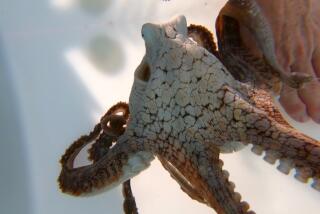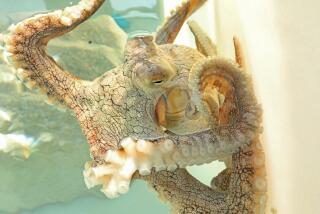South Korean fishermen, health officials tangle over octopus
- Share via
Reporting from Seoul — The newspaper headline captured the latest cuisine controversy in this seafood-crazy country: “Can eating octopus heads be hazardous to your health?”
A favorite dish for generations of Koreans, octopus heads have long been associated with good nutrition, not to mention their reputed qualities as an aphrodisiac.
But a Seoul city government study last month determined that the delicacy contains dangerous levels of the heavy metal cadmium. The findings touched off what newspapers have dubbed “the octopus head war,” pitting city health officials against irate fishermen protective of the $35-million industry.
In South Korea, octopus is perhaps second in popularity only to kimchi, the unofficial national dish. About 12 million of the invertebrates are sold annually.
Nakji, a dish featuring baby octopuses, head and all, is a popular snack at sporting events. Another dish, sannakji (“live octopus”), features squirming tentacles dipped in a sesame oil and salt sauce. Enthusiasts have been hospitalized after a wiggling tentacle lodged in the throat.
Seoul officials found that the octopuses being sold at local markets contained nearly 15 times the government’s permitted 2-milligram-per-kilogram level of cadmium, a carcinogen known to poison the liver and kidney if consumed in large enough amounts.
Officials advised consumers of octopus to remove all internal organs, ink and intestinal matter, a precaution that many people say would also remove most of the dish’s taste.
Some consumers took the advice to heart.
“It’s not my favorite dish to begin with, but I won’t eat it at all now after the government warning,” Lee Myung-hwa said as she handed out samples at a food market.
Restaurant worker Baek Mun-soo said he likes the fresh taste of live octopus tentacles. “Live means fresh,” he said. “But I won’t eat the heads. That’s not healthy.”
Fishermen blasted officials after octopus prices plummeted. “The fishermen here are dumbfounded,” said Im Hyun-ki, head of an octopus production association in South Jeolla province.
“The Seoul metropolitan government jumped the gun. Of course you have to test food for safety, but they seemed just too eager to make a case without properly thinking it through.”
Then, as things often do in this rough-and-tumble, speak-your-mind society, the controversy got political.
In a show of support for the seafood industry, several minority party lawmakers brought a live octopus to a meeting of the National Assembly, eliciting laughs when the creature tried to slither from its jar.
After conducting their own tests, officials from South Korea’s Food and Drug Administration declared that it was safe to eat as many as two octopuses a day, heads and all.
Emboldened fishermen threatened to sue unless the Seoul government apologized. But city officials refused to back down. Although Mayor Oh Se-hoon said he was sorry that the fishing industry had been hurt, he insisted that public health was at stake. “We had to make people aware of this,” he said.
Last week, to mend fences with fishermen, officials held a “Seoul Nakji Day” to encourage consumers to eat more octopuses, which they said are “safe when internal organs are removed.”
Organizers posed for pictures as they slurped down tentacles. But the octopus industry fumed that consuming the animals without the heads sent the wrong message.
“Why sponsor a day promoting Korean octopus if you’re not going to eat the best part?” Im said. “It makes no sense and adds salt to the wound.”
Ethan Kim in The Times’ Seoul Bureau contributed to this report.
More to Read
Sign up for Essential California
The most important California stories and recommendations in your inbox every morning.
You may occasionally receive promotional content from the Los Angeles Times.














